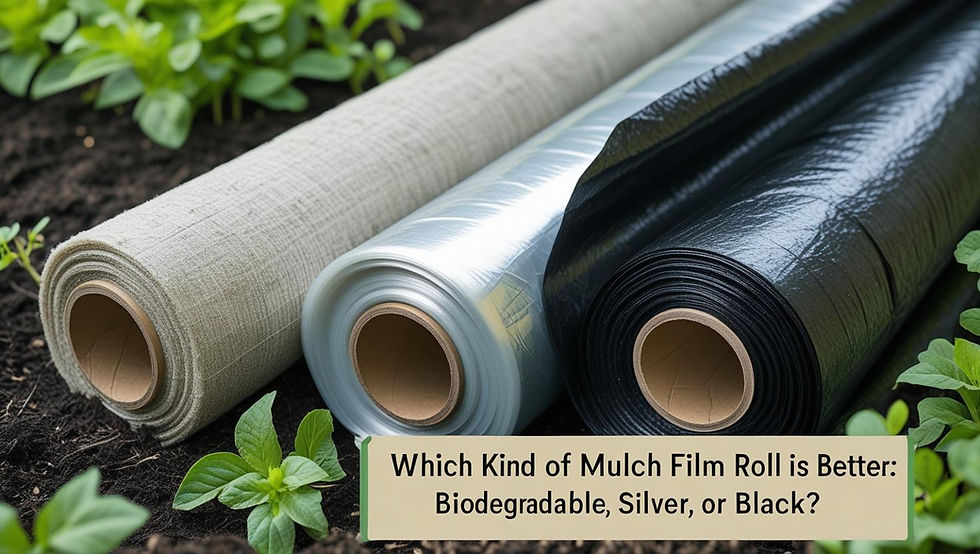Different Types of Mulching in Agriculture: An Analysis of Organic and Plastic Mulch
- Rahul Solanki
- Aug 7
- 4 min read

Introduction
Mulching in agriculture has emerged as a vital practice to boost crop health, enhance soil fertility, and improve farm productivity. As farmers adopt innovative techniques to optimize yields, mulching stands out for its simplicity and effectiveness. This article explores the differences between organic and plastic mulch, helping you determine which option is best suited for your farm. From performance analysis to environmental impact, you’ll gain a full understanding of these two popular mulching methods.
Understanding Mulching in Agriculture
What Is Mulching?
Mulching refers to the practice of covering the soil with organic or synthetic materials to conserve moisture, regulate temperature, and suppress weeds. Historically, farmers have used straw and leaves for this purpose, but modern agriculture has expanded options to include plastic mulching sheets. The technique plays a crucial role in sustainable farming.
How Mulching Supports Plant and Soil Health
Mulching in agriculture provides numerous benefits that directly impact both soil and plant health:
Weed control: A proper mulch layer prevents light from reaching weed seeds.
Soil temperature regulation: Mulch acts as insulation, keeping soil warmer in winter and cooler in summer.
Moisture conservation: It minimizes evaporation, reducing irrigation needs.
Erosion prevention: It reduces soil runoff from rain and wind.
Organic Mulch: Natural Soil Enhancer
Types of Organic Mulch
Organic mulch is derived from natural materials and breaks down over time to enrich the soil.
Straw and Hay
These are commonly used in vegetable gardens. Straw offers great coverage, while hay provides nutrients as it decomposes.
Grass Clippings and Leaves
These materials decompose quickly, releasing nitrogen into the soil. They're ideal for crops needing rapid growth.
Wood Chips and Bark
Though slower to decompose, they enhance soil texture and suppress weeds for long periods.
Advantages of Organic Mulch
Enriches the soil with nutrients over time
Promotes healthy microbial activity
Environmentally friendly and easy to source
Disadvantages
Requires frequent replacement
Can harbor pests or diseases if not monitored
Plastic Mulch: Engineered for Performance
Introduction to Plastic Mulching Sheet
A plastic mulching sheet is a thin film made of polyethylene or biodegradable polymers. It’s designed to be laid over soil to maximize crop performance. This form of mulching in agriculture has grown popular for high-value crops like tomatoes and peppers.
Types of Plastic Mulching Sheets
Black plastic mulch: Suppresses weeds and warms the soil.
Silver-black mulch: Reflects light to deter pests and control soil temperature.
Transparent film: Allows light through but still helps with temperature and moisture.
Benefits of Plastic Mulch
Excellent moisture retention and soil warming
Enhanced weed suppression without chemicals
Promotes early and increased harvest
Limitations
Environmental disposal challenges
Costlier than organic mulch
Requires proper installation and removal
Comparing Organic vs. Plastic Mulch
Performance Analysis
Soil Temperature Control
Plastic mulch generaly outperforms organic mulch in retaining and boosting soil warmth, especially during early planting seasons.
Moisture Retention
Both types perform well, but plastic mulch is more effective in preventing evaporation due to its impermeable surface.
Impact on Crop Yield
Plastic mulching sheets can lead to higher and earlier yields. However, organic mulch can maintain long-term soil health, leading to sustained production.
Environmental Impact
Biodegradability and Sustainability
Organic mulch decomposes naturally, adding organic matter back into the soil. Some plastic mulches are biodegradable, but many are not, which raises concerns.
Pollution and Waste Management
Plastic mulch requires responsible disposal. When mismanaged, it can contribute to plastic pollution, unlike organic mulch that naturally integrates into the ecosystem.
Choosing the Right Mulch for Your Farm
Factors to Consider
When selecting a mulching option, consider the following:
Crop Type: Certain crops benefit more from specific mulch types.
Climate Conditions: Warmer or cooler environments influence mulch performance.
Budget: Organic mulch is cheaper upfront, but plastic mulch may yield faster ROI.
Long-term Goals: Consider whether your priority is short-term yield or soil health.
Expert Tips for Farmers
Use plastic mulch for crops requiring quick, high-volume harvests.
Opt for organic mulch in sustainable, long-term crop rotations.
In some cases, combining both can maximize benefits—use organic mulch after the plastic mulch has done its job.
Conclusion
Summary of Key Insights
Mulching in agriculture is more than just a trend—it’s a necessity in modern farming. Organic mulch offers eco-friendly and nutrient-rich benefits, ideal for long-term soil health. On the other hand, plastic mulching sheets provide quick wins with weed control and water retention. By understanding your farm’s unique needs, you can choose the mulch that offers the best combination of performance, cost-efficiency, and sustainability.
FAQ
Is organic mulch better than plastic mulch for all crops?
Not necessarily. While organic mulch is more sustainable, plastic mulch can be more effective for certain high-yield crops that require faster growth.
Can plastic mulching sheets be reused?
Some types can be reused for a few seasons, but most are designed for single-use and must be disposed of properly.
What is the cost difference between organic and plastic mulch?
Organic mulch is typically cheaper upfront but requires more frequent replenishment. Plastic mulch is costlier but can result in higher yields.
Are biodegradable plastic mulches available?
Yes, newer products use biodegradable polymers that offer similar benefits with less environmental impact.
How do I apply mulch effectively around crops?
Apply mulch after planting and ensure it covers the soil completely. Leave space around the plant base to prevent rot and pest issues.
For More Information Visit: Tilak Poly pack Pvt.Ltd



Comments